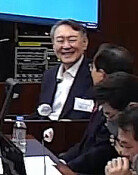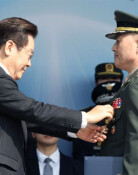[Editorial] Roh, Burdened By His Words Overseas, Returning Home
[Editorial] Roh, Burdened By His Words Overseas, Returning Home
Posted April. 17, 2005 23:37,
President Roh Moo-hyun is scheduled to return this morning from his seven-day and eight-night visit to Germany and Turkey. Germany is an important nation because it is a benchmark for Korea to achieve unification, and, as opposed to Japan, it has been striving to compensate for its past atrocities. Turkey is a blood ally, which sent the third largest number of troops after the U.S. and Britain during the Korean War. Against this backdrop, President Roh made several noticeable remarks on the inter-Korean relationship, international politics, national and global economic issues and other topics. Those remarks deserve some analysis in that they came from the highest political leader of a state.
At a meeting with Korean residents in Turkey, the president said, Some Koreans sound more pro-American than some Americans do. That worries me. But Koreans cannot help but be concerned about the presidents thinking and what lies behind this comment. If he considers emphasis on maintaining and enhancing the ROK-U.S. alliance for the sake of security needs to be a worrying pro-American stance, that is worrying.
Given what has happened with President Rohs a balancer in Northeast Asia comment, what comes from mouth always has the possibility of an unintended misunderstanding. This is why a leader should be prudent about his words. Some even point out that parts of the Uri party as well as the U.S. wrongly assumed that the balancer theory implied some sort of independence from the U.S.
Moreover, many Koreans are doubtful about the intention and feasibility of the balancer theory. In fact, President Rohs remarks or comments entail more explanations from his aides than any other Korean presidents. This indicates that what he says is either ambiguous or readily mistakable.
While the president challenged pro-American stance, he reassured his audience, saying, The ROK-U.S. alliance is sound and strong. However, there are various points of contention between Korea and the U.S.: revisions to Operation Plan (OPLAN) 5029, a reduction in Koreas share of defense expenses, the disposal of War Reserves Stocks for Allies (WRSA), a reduction in the Zaytun troops, changes in the roles of the United States Forces Korea (USFK), and others. These disputes send Koreans the same warning message.
President Roh announced, Considering all aspects of the economy, including the price index, foreign exchange rates, economic growth and unemployment, the recovery of the Korean economy is unmistakable. Still, not everyone agrees. President Roh set aside his script and made the remarks impromptu at a meeting with Korean and Turkish businessmen in Turkey. In fact, various economic indicators point to a different reality far from a robust recovery. One wonders whether the president can say the same thing back in Korea.
In Berlin, President Roh said, If necessary, South Korea will express its disapproval to its northern counterpart, and warned Japan by supporting Germanys way of cleaning up his past legacy. On those remarks, he surely deserves praise. The president also conveyed meaningful messages by proposing a four-stage unification of the two Koreas, and reassuring listeners, I will guarantee foreign companies their lawful operating profits.
Now, President Roh should take time to reflect on what he said outside Korea, and figure out how to promote national interests. This is exactly what presidential overseas visits are supposed to do.




![두쫀쿠가 뭐라고…영하 8도에 아이들 1시간 줄세운 어린이집 [e글e글]](https://dimg.donga.com/c/138/175/90/1/wps/NEWS/IMAGE/2026/01/09/133126969.3.jpg)
![지하철 타고 가는 북한산성…외국인도 반한 ‘K등산 맛집’[전승훈 기자의 아트로드]](https://dimg.donga.com/c/138/175/90/1/wps/NEWS/IMAGE/2026/01/10/133120824.1.jpg)

